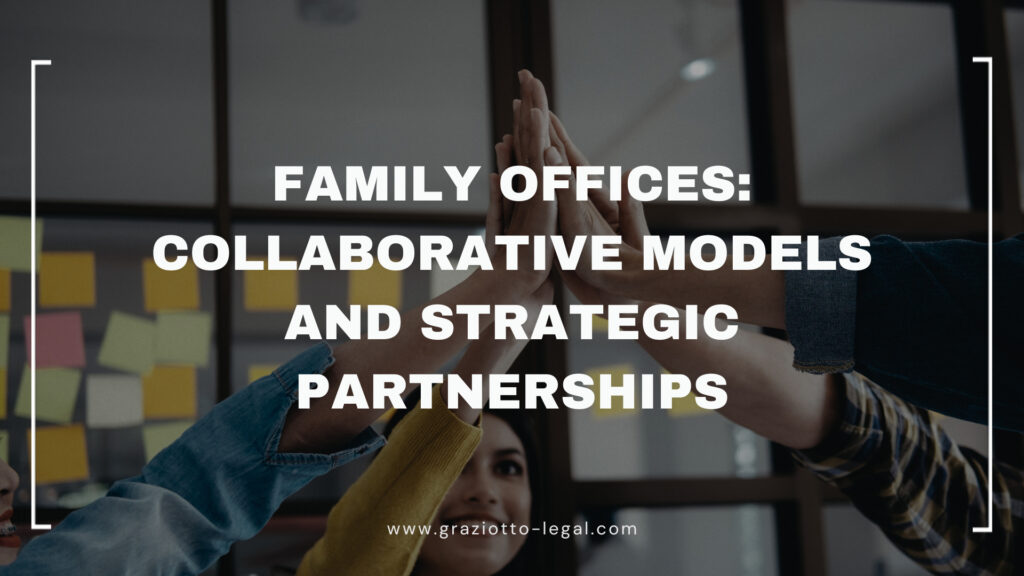

Since 2010, the Global Law Experts annual awards have been celebrating excellence, innovation and performance across the legal communities from around the world.
posted 1 year ago
The modern financial landscape is characterized by a complex web of relationships, regulations, technologies, and global dynamics. As family offices evolve, so does the necessity for collaboration and forming strategic partnerships. In today’s investment world, where data,
knowledge, and specialized skills are paramount, collaborative models offer distinct advantages, and this sub-section examines the reasons, mechanisms, and implications of these collaborations for family offices.
Collaborative models refer to the structured engagements and partnerships formed between different entities for mutual benefit. In the context of family offices, this can include collaboration with other family offices, financial institutions, investment firms, technology providers, or even non-profit organizations. These relationships can take various forms, from informal networking to formalized joint ventures or alliances.
Several driving forces are prompting family offices to consider collaborative models:
1. Access to Specialized Expertise: Collaboration allows family offices to tap into specialized skills and expertise that may not be internally available. It may include technical know-how, market insights, or regulatory compliance expertise.
2. Economies of Scale: By pooling resources with others, family offices can achieve economies of scale, accessing investment opportunities, technology, or services that might be otherwise prohibitive in cost.
3. Risk Mitigation: Collaborative engagements can spread risk, particularly when exploring new markets or investment areas. It provides a shared burden, offering some level of insulation from potential losses.
4. Alignment with Values and Goals: Collaborations with entities that share similar values, goals, or social objectives can lead to synergistic relationships that amplify the impact and relevance of initiatives.
5. Navigating Complexity: The financial landscape is increasingly complex. Collaborative partnerships allow family offices to navigate this complexity more effectively by leaning on the expertise and resources of partners.
Different collaboration models are suited to various needs and contexts. They may include:
1. Joint Ventures: Formal agreements to work together on specific projects or investment opportunities.
2. Networks and Alliances: Loose networks or more formal alliances that provide platforms for knowledge sharing, networking, and joint action on shared interests.
3. Outsourcing Partnerships: Engaging external providers for specific services such as technology, legal compliance, or asset management, leveraging their specialized expertise.
4. Impact Collaborations: Partnerships with non-profits, governmental organizations, or other family offices to achieve shared social or environmental goals.
5. Innovation Partnerships: Collaborations with technology firms, startups, or research institutions to access innovative solutions and stay ahead of technological trends. Implementing Collaborative Models
1. Clear Objectives: Define the purpose, objectives, and expected outcomes of the collaboration.
2. Due Diligence: Assess potential partners for alignment in values, goals, competence, and credibility.
3. Structured Agreements: Formulate clear agreements that outline roles, responsibilities, contributions, and mechanisms for conflict resolution.
4. Ongoing Communication: Maintain open, transparent communication with all parties to ensure alignment and address any emerging issues.
5. Monitoring and Evaluation: Implement robust mechanisms for monitoring performance and evaluating the success of the collaboration.
Collaborative models, while offering many benefits, are not without challenges and risks:
1. Misalignment of Interests: Differences in goals, values, or expectations can lead to conflicts.
2. Confidentiality and Security Concerns: Sharing information and resources can expose family offices to potential confidentiality breaches or security risks.
3. Complexity in Management: Managing collaborative relationships can be complex, requiring time, effort, and skills to nurture and sustain.
4. Legal and Regulatory Compliance: Ensuring that all aspects of collaboration comply with relevant legal and regulatory requirements is critical.
Collaborative models and strategic partnerships have become integral to the modern family office landscape. They offer access to specialized expertise, economies of scale, risk mitigation, and opportunities to align with values and goals.
However, collaboration is not without challenges, and it requires careful planning, due diligence, and ongoing management. The choice of collaborative models must be aligned with the family office’s unique needs, goals, risk profile, and strategic vision.
The emergence of collaborative models in family office management reflects a broader shift in the investment world towards more interconnected, synergistic approaches. It recognizes that in a complex, rapidly changing environment, no entity can thrive in isolation.
Collaboration becomes not just a strategic choice but a necessary adaptation, unlocking new opportunities and equipping family offices to navigate the intricacies of the global investment landscape.
Family offices that engage in well-planned, aligned, and effectively managed collaborations will find themselves better positioned to exploit opportunities, mitigate risks, and achieve their long- term objectives.
For more in-depth information you can consult my latest book «The Global Manual for Family Offices», Volume 1, Chapter 4.4.3, Pg. 289.
http://amazon.com/author/fulvio-graziotto
For more up to date legal insights follow us @GLE News
Author


No results available
posted 16 hours ago
posted 18 hours ago
posted 18 hours ago
posted 18 hours ago
posted 18 hours ago
posted 18 hours ago
posted 18 hours ago
No results available
Find the right Legal Expert for your business
Global Law Experts is dedicated to providing exceptional legal services to clients around the world. With a vast network of highly skilled and experienced lawyers, we are committed to delivering innovative and tailored solutions to meet the diverse needs of our clients in various jurisdictions.

Thinking of buying property in Brazil? Start with a full legal safety net.
✔️ Check title and ownership history
✔️ Verify no debts or disputes
✔️ Confirm zoning and permits.
#BrazilProperty #RealEstateInvesting #LegalDueDiligence #ForeignInvestment #PropertyLaw #GlobalRealEstate #InvestmentRisk #BrazilLaw

When your international business faces financial distress, quick action is key! 🔑 Negotiating with creditors, restructuring debt, and understanding insolvency laws can help regain stability. Global Law Experts is here to guide you through your options.
🌍Explore the details on our website.
🔗Link in bio
#GlobalLawExperts #CommercialLaw #BusinessLaw #LegalAdvice #BusinessGrowth #LegalTips #BusinessStrategy #LegalCompliance #Law #LegalKnowledge #LegalAwareness #Law101 #LegalEducation #IntellectualProperty

Thinking of buying property in Brazil? Don’t stop at the contract or key handover. Make sure the title is officially registered before calling it yours.
#BrazilRealEstate #PropertyLaw #GlobalInvestment #ForeignInvestors #LegalTips #DueDiligence #RealEstateRegistration #SecureInvestment

Getting a termination notice right now? Know your rights. Valid reason, fair process, proper notice they matter. Don’t let a bad dismissal walk away without accountability.
#EmploymentLaw #WorkerRights #Termination #LaborLaw #FairDismissal #WorkplaceJustice #LegalAwareness #GlobalWorkforce

Running a business is hard enough — lawsuits shouldn’t make it harder. 🚫 Protect your business with the right legal strategies and expert tools from Global Law Experts. Let’s secure your future together! 💼
🌍Explore the details on our website.
➡️www.globallawexperts.com
#GlobalLawExperts #CommercialLaw #BusinessLaw #LegalAdvice #BusinessGrowth #LegalTips #BusinessStrategy #LegalCompliance #Law #LegalKnowledge #LegalAwareness #Law101 #LegalEducation #IntellectualProperty #Infringed #Ecommerce #LegalBranding
Global Law Experts is dedicated to providing exceptional legal services to clients around the world. With a vast network of highly skilled and experienced lawyers, we are committed to delivering innovative and tailored solutions to meet the diverse needs of our clients in various jurisdictions.

Thinking of buying property in Brazil? Start with a full legal safety net.
✔️ Check title and ownership history
✔️ Verify no debts or disputes
✔️ Confirm zoning and permits.
#BrazilProperty #RealEstateInvesting #LegalDueDiligence #ForeignInvestment #PropertyLaw #GlobalRealEstate #InvestmentRisk #BrazilLaw

When your international business faces financial distress, quick action is key! 🔑 Negotiating with creditors, restructuring debt, and understanding insolvency laws can help regain stability. Global Law Experts is here to guide you through your options.
🌍Explore the details on our website.
🔗Link in bio
#GlobalLawExperts #CommercialLaw #BusinessLaw #LegalAdvice #BusinessGrowth #LegalTips #BusinessStrategy #LegalCompliance #Law #LegalKnowledge #LegalAwareness #Law101 #LegalEducation #IntellectualProperty

Thinking of buying property in Brazil? Don’t stop at the contract or key handover. Make sure the title is officially registered before calling it yours.
#BrazilRealEstate #PropertyLaw #GlobalInvestment #ForeignInvestors #LegalTips #DueDiligence #RealEstateRegistration #SecureInvestment

Getting a termination notice right now? Know your rights. Valid reason, fair process, proper notice they matter. Don’t let a bad dismissal walk away without accountability.
#EmploymentLaw #WorkerRights #Termination #LaborLaw #FairDismissal #WorkplaceJustice #LegalAwareness #GlobalWorkforce

Running a business is hard enough — lawsuits shouldn’t make it harder. 🚫 Protect your business with the right legal strategies and expert tools from Global Law Experts. Let’s secure your future together! 💼
🌍Explore the details on our website.
➡️www.globallawexperts.com
#GlobalLawExperts #CommercialLaw #BusinessLaw #LegalAdvice #BusinessGrowth #LegalTips #BusinessStrategy #LegalCompliance #Law #LegalKnowledge #LegalAwareness #Law101 #LegalEducation #IntellectualProperty #Infringed #Ecommerce #LegalBranding
Send welcome message